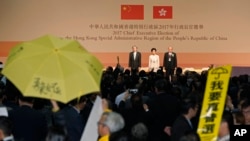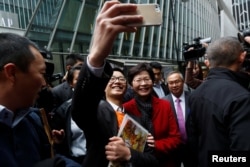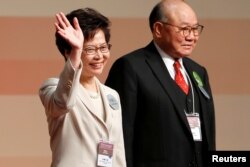Hong Kong police on Monday told at least nine organizers of 2014's pro-democracy demonstrations they will face charges, protest leaders said, an ominous sign just a day after a new Beijing-backed leader was chosen, vowing to unite society.
The move, which has already provoked anger and disbelief among democrats, heightened political tension in the Chinese-ruled city, with a protest rally to be held outside police headquarters in the Wanchai bar district on Monday night.
Former chief secretary Carrie Lam was chosen by a 1,200-person committee to lead the city, pledging in her victory speech to unite political divisions that have hindered policy-making and legislative work.
But the timing of the telephone calls, almost 2½ years after the protests brought parts of the city to a standstill for months, is unlikely to help heal wounds.
Sociology professor Chan Kin-man, one of the core protest leaders, said police told him he would be charged with three crimes, including participating and inciting others to participate in "public nuisance".
"I am already mentally prepared for this, but I am very worried about Hong Kong's future," Chan told Reuters.
It wasn't immediately clear why authorities had waited so long to pursue the charges. The police did not immediately respond to a Reuters request for comment.
Asked by reporters about the timing, Lam said she couldn't intervene with prosecutions carried out by the administration of incumbent leader Leung Chun-ying.
"I made it very clear that I want to unite society and bridge the divide that has been causing us concern, but all these actions should not compromise the rule of law in Hong Kong and also the independent prosecution process that I have just mentioned," said Lam, who will take office on July 1. Chan, however, disputed this.
"The message is strong. Carrie Lam said she wanted to mend the society, but the message we got today is prosecution. I don't see how the society's cracks can be mended," Chan told Reuters.
Hong Kong returned from British to Chinese rule in 1997, with the promise of a high degree of autonomy and other freedoms not enjoyed on the mainland, but Communist Party rulers in Beijing never hid their anger at the protests which they deemed illegal.
Lawmaker Tanya Chan said at least nine protest leaders including herself received calls from the police notifying them of their charges.
Another protest leader, University of Hong Kong law professor, Benny Tai, confirmed to Reuters by text he had been contacted by police.
Lam met with incumbent leader Leung Chun-ying earlier on Monday. They shook hands and both expressed confidence in a "smooth and effective" leadership transition.
Lam was Leung's deputy as chief secretary for the past five years and is known as a tough, though competent administrator.
The next few months will be critical for Leung and Lam, with Chinese President Xi Jinping expected to pay a visit on July 1 to celebrate Hong Kong's 20th anniversary of the handover, with large protests expected.
Part of the public mistrust towards Lam stems from her close working relationship with the staunchly pro-Beijing Leung, who protesters say ordered the firing of tear gas on protesters in 2014.
Balance
All of Hong Kong's three other post-handover leaders have struggled to balance the demands of China's stability-obsessed Communist Party leaders, with the wish of many residents to preserve the global financial hub's liberal values and rule of law that have long underpinned its economic success.
"She has been elected pretty much solely on the support of Beijing," said political scientist Ma Ngok.
"If that's the case, she might have a lot of debts that she has to repay to her supporters in Beijing."
Student activist Joshua Wong, 20, one of the leaders of the student-led "Umbrella Movement" protests in 2014, said last week Lam's victory was "a nightmare" for Hong Kong.
"Theoretically, the chief executive is a bridge between the central government and the Hong Kong people," he said. "But Lam will be a tilted bridge. She will only tell us what Beijing wants and won't reflect what the people want to the communist regime."







